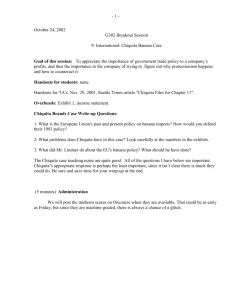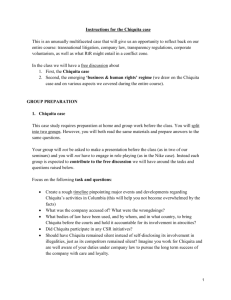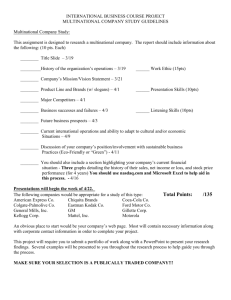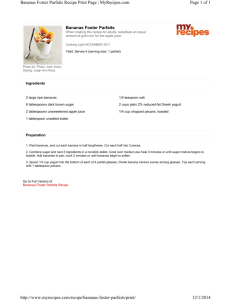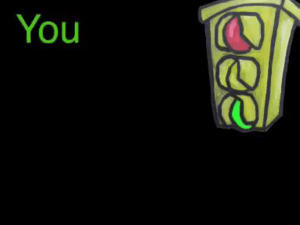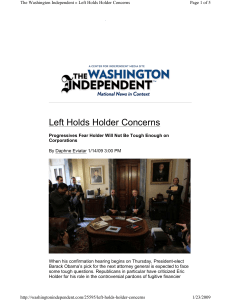Example of a well-written case
advertisement
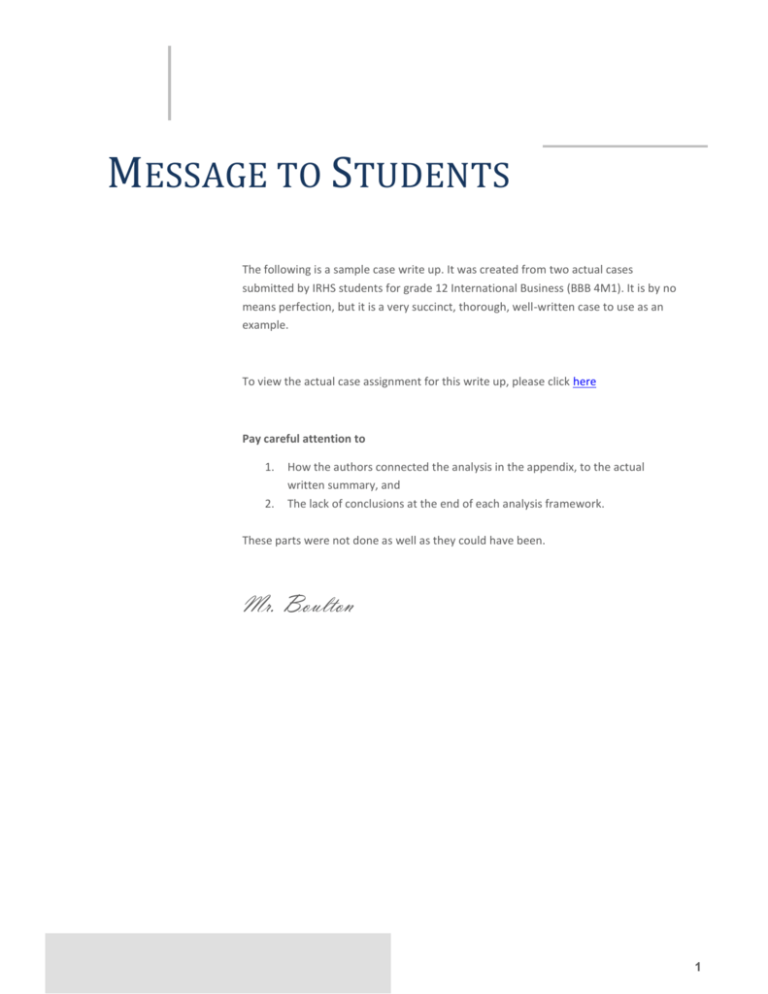
MESSAGE TO STUDENTS The following is a sample case write up. It was created from two actual cases submitted by IRHS students for grade 12 International Business (BBB 4M1). It is by no means perfection, but it is a very succinct, thorough, well-written case to use as an example. To view the actual case assignment for this write up, please click here Pay careful attention to 1. 2. How the authors connected the analysis in the appendix, to the actual written summary, and The lack of conclusions at the end of each analysis framework. These parts were not done as well as they could have been. Mr. Boulton 1 March 8, 2016 Memorandum To: Mr. Boulton From: Some Student Date: March 8, 2016 Re: Case Analysis for Chiquita Banana A NALYSIS OF C URRENT S ITUATION Chiquita Banana did not take into account numerous factors when they were trying to sell their product. The European Union placed tariffs on Latin American countries as they granted preferential status to former African, Caribbean and the Pacific Rim colonies. This made it more expensive for Chiquita Bananas to export their bananas to the European Union, and would force Chiquita to increase their selling price. The European Union chose to import bananas from Africa, Caribbean and the Pacific Rim because they were cheaper than Chiquita. Chiquita Banana had no way of predicting in the long run that the European Union would favour Africa and place restrictions on their product. (refer to Appendix A) Another problem with Chiquita’s decisions was that they did not take into account natural disasters. The company grew most of their products in the Latin Americas and because they were so reliant on that area when their products were destroyed after a major hurricane, they were not prepared. Their product was wiped out and with no other locations to grow their product, their company suffered great losses. (refer to Appendix A) 2 March 8, 2016 The last problem that resulted in Chiquita’s financial problems was that they decided to expand globally too fast and as a result, were pushed further into debt. This could have been because they decided to expand further into the global market for the wrong reasons. The company may have perhaps not known the market they were expanding into because they did not do the proper research. A LTERNATIVE C OURSES OF A CTION 1. CONCENTRATE ON THE AMERICAS 2. DIVERSIFY PRODUCTION 3. EXPAND TO EUROPE MORE AGGRESSIVELY 4. DIVERSIFY PRODUCT LINE 1.CONCENTRATE ON THE AMERICAS Based on our analysis of Chiquita Banana’s financial struggles we have a number of possible solutions for improving the company. Chiquita Bananas had no way of predicting that the European Union would favour its former colonies over Chiquita’s locations in Latin America. After the European Union put quotas and tariffs on Chiquita’s products, Chiquita should have re-evaluated whether or not to continue to export to Europe. Although they would lose a significant amount of business if they stopped exporting to Europe, the reason they were in debt in the first place was because Europe restricted import of their products and this was a problem since Europe was Chiquita’s main market. If the company had concentrated within the Americas then they would not have been forced into so much debt. 3 March 8, 2016 2. DIVERSIFY PRODUCTION In order to limit the amount they were affected by natural disasters, the company could have grown bananas in other parts of the world. This would be better for the company because if natural disasters did strike in an area where they grow their products then it would not be such a financial blow as they would have more sources to receive their product. The only problem with this solution would be that it may cost more to be located in other areas, however in the long run it would be worth it. (refer to Appendix B) 3. EXPAND TO EUROPE MORE AGGRESSIVELY Expanding to Europe may have seemed like a good idea at the time however the consequences may not have been thought out. While doing business with the European Union, Chiquita made their company international and globally well known, but it also left them with a lot of debt. By keeping the company local and focusing on countries with fewer tariffs or perhaps expanding slower they may have avoided this problem. They would not be a global company anymore, however they would not have been able to climb out of debt and gradually expand. 4. DIVERSIFY THE PRODUCT LINE Chiquita Banana is not a unique company as there are numerous companies that are able to supply bananas. These companies such as Del Monte and Dole also suffered as a result of Europe’s quotas and tariffs; however they diversified their product in order to better compete with other companies. Chiquita needs to offer something different to consumers in order to compete in the market place. Perhaps they could offer fruit juices, canned goods or any other fruit related product that have not been introduced into the market yet. This would make them more appealing to consumers. 4 March 8, 2016 R ECOMMENDATION After careful analysis of Chiquita Banana’s financial situation we have decided the best that the best course of action would be that the company ceases to export to Europe. By doing this they will eliminate the cost of tariffs that are placed on their products. They will be free to expand to other countries such as the United States where they will not have to pay as high tariffs (see Appendix A). This will also cut down on shipping costs as they will not have to export their products as far. We recommend that the company reevaluate their management staff to ensure that the company is running as efficiently and productively as possible. Before entering a new market they should ensure their research staff has conducted sufficient research on their targeted market. By doing this it will ensure that they understand and have prepared themselves as best as possible for the possible outcomes from their new market (refer to Appendix C). When selling their products to the American market Chiquita Banana should make their company more unique to gain a competitive advantage. Other companies such as Del Monte and Dole have more diverse products to offer to the market and if Chiquita does not adjust their product line they will not be able to compete with other companies. To conclude, Chiquita Bananas needs to stop exporting their products to Europe as this has forced them into significant debt. We recommend that they export within North America. We also recommend that they adjust their line of products in order to make their company more unique to compete in their market.1 1 Boulton, J. BBB 4M1 Case – WTO EU Chiquita Bananas. Available online at: www.StudCo.ca/irhs, March 8, 2016 5 March 8, 2016 I MPLEMENTATION AND I MPACT Impact is poorly discussed here. Although Chiquita Banana will no longer be receiving business from the European Union they will have significantly cut down on their exporting costs (transportation costs, exchange rates, etc). (see Appendix B) The following is a timeline of the courses of action that Chiquita needs to implement order to be successful and pull itself out of debt. STEP ONE - Cut down on exports to Europe. This should be done gradually so that it does not affect the company too much all at once. STEP TWO - Research any new target markets. Ensure that all advertisements are appropriate for the area where they are being launched in order to avoid any cultural disputes. STEP THREE - Re-evaluate management. Chiquita needs to ensure that their company is run to its full potential before expanding throughout the Americas. Step Four- Gradually acquire plantation locations. This should be done in order to prevent a dramatic effect on their company due to a natural disaster striking a given area. STEP FIVE - Research any possible new products in order to ensure that they will be successful in that market. STEP SIX - Gradually add to product line. This will allow a more unique approach to the American market and will generate extra revenue for the company. It also allows for competition against similar companies. (refer to Appendix B) 6 March 8, 2016 A PPENDIX A: S.W.O.T. A NALYSIS STRENGTHS OPPORTUNITIES Long history and experience in the banana business Well known brand, especially in Latin America The blue and yellow Chiquita label along with the Chiquita banana lady is well known The Chiquita brand commands a price premium and represents quality bananas in the minds of consumers Known as the world’s largest banana company The company has a diverse fruit company which also sells canned fruit, vegetables and juices worldwide, marketing its products in over 60 countries on six continents The quality of the product To file chapter 11 bankruptcy Convince bondholders to exchange debt for equity Continue to expand globally WEAKNESSES THREATS Unpaid debt Over expansion of shipping operation at an inappropriate time Poor hiring and training skills of their employees No diversification Did not plan for environmental changes Worldwide banana surpluses EU import quotas Stock price down from $50 to $1 Hurricane Mitch destroyed banana crop in Honduras A possibility of going bankrupt Competition such as Dole Trade policies Increase in tariffs Weather CONCLUSION: We have concluded that the only way for Chiquita Banana to recover is to pay of their debts by eliminating their exporting to Europe to fix the damages already made. They should expand their product diversity in order to compete in their new market and be successful. 7 March 8, 2016 A PPENDIX B: S.T.E.E.P.E.C. I MPACT A NALYSIS The following is an analysis on the impact of our recommendations as found in the write-up. SOCIAL SHORT-TERM PROS Trying ton fix the problem of debt New management could mean better chemistry with workers TECHNOLOGICAL ECONOMICAL ETHICAL Lay off old bad workers and become more conservative with spending New employees at starting salaries They need to build up the relationships POLITICAL New management more appealing to other countries ENVIRONMENTAL Take up less land because already overproduction of bananas COMPETITIVE -New management comes up with new ideas to become competitive CONS Will lose a lot of old employees who would be mad New employees don’t have the skills yet Not enough profit could go to technology due to new untrained workers A lot more debt at first due to untrained workers Spending on training workers New management has to build relationships aqain Countries don’t like the idea of change -Would be a lot less competitive because company is reorganizing management LONG-TERM PROS Employees are better trained then the previous ones so are more dependable CONS New management and employees could be worse as the old ones Newly trained management means new ideas of maximizing profit with different technology A lot more profit, debt could be paid off due to better management -New management trying new things could mean they invest in dumb technology After a while could be trusted New management miqht be immoral Better relationships with other countries due to better management Countries could hate new policies -Company becomes a lot more competitive because it has been reorganized to compete in the current market Stock prices fell from $50 in 1991 to $1 in 2000 Could take up more land if business goes well to produce more bananas Old sources for exporting bananas might have found new company’s to buy bananas while we were under reorganizing CONCLUSION: Missing…. 8 March 8, 2016 A PPENDIX C: P ORTER ’ S F IVE F ORCES A NALYSIS Current Market Conditions for Bananas POWER OF BUYERS The brand, Chiquita Banana, is well known and trusted so its most likely to be bought over other competing companies The buyer has the power to decide if the product is good enough If the product isn’t selling, then buyer is telling the supplier that bananas are not up to grade The banana isn’t a vital product but they are often because they are healthy and people enjoy the taste of the product If Chiquita Bananas are not priced to sell, then the buyer will go somewhere else such as another competing market such as Dole POWER OF SUPPLIERS If Chiquita has a higher price they will lose their known buyers If the buyer isn’t a big company they get the price they asked for If the price is too high, competitors who have lower prices, their product will be bough Since Chiquita is so well known and it quite superior they can name their own asking price and get that price because Chiquita Bananas are well known and the buyer will want to buy a product that the consumers trust AVAILABILITY OF SUBSTITUTES If Chiquita were to raise their prices, Dole buyers would increase even though Chiquita is very well known and the most bought brand of banana They buyers willingness to substitute Chiquita bananas if something went wrong or if it was too expensive, the buyer would substitute for a product such as Dole bananas Bananas are a product that many grocers have unless there is a natural disaster that wiped out the supply like Hurricane Mitch where it destroyed Chiquita’s plantations in Honduras in 1998 BARRIERS TO ENTRY The brand of the banana being known allows Chiquita Bananas to be apart of the market Tariffs such as the ones the European Union set on Chiquita’s supply RIVALRY IN THE MARKET A lot of competition such as Dole and Del Monte Way banana is grown which includes the process from beginning to end and if its organically grown or not are all factors in why someone would choose one product over the other CONCLUSION: Missing…. 9 March 8, 2016 A PPENDIX D: R OOT P ROBLEM A NALYSIS Of Current Situation 1st Generation Problems (Surface Problems) Chiquita Banana didn’t pay off the debt when they were in the position to do so Natural disasters Hurricane Mitch destroyed Chiquita’s banana plantations in Hoduras 2nd Generation Problems 3rd Generation Problems 4th Generation Problems Too much debt to begin with Risky policy financing policies Over expansion Spending money on unnecessary things like choosing wants over needs Vice-president making the wrong policy decisions Poor operations management Poor financial management The crops are destroyed and their profits fall No supply, no profit If there are no detection systems, then the farmers aren’t prepared to protect the crops in any way Hiring/training of managerial positions The EU expressed a concern that the economies of the former colonies would be greatly harmed if preferential treatment were not granted and that many of these economies were very dependant on bananas as a source of foreign exchange Didn’t anticipate that it was going to happen Some observers feel that after the tariffs were laid, they felt Chiquita did not manage its operations effectively and did not plan for adverse environmental changes Didn’t pay off the debt because they wanted to expand its shipping operations Other priorities Not the right people in charge No way to protect the crops No detection systems Tariffs from the European Union Quotas on imports of bananas in Latin America where Chiquita sourced its_products The EU began granting preferential status to banana producing former colonies in Africa, the Caribbean and the Pacific Rim 5th Generation Problems Global warming Managerial positions were hired or trained properly and aren’t able to deal with any of the problems 10 March 8, 2016 CONCLUSION: Missing…. 11
